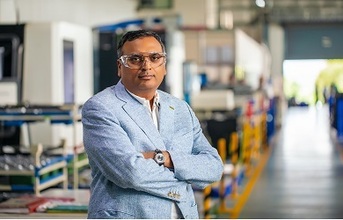
In the past, I could have easily dismissed the Hattargi village in Karnataka's Belgaum district as a non-descript place. Today, it is a different story! Having recently visited Hattargi, I now understand why aerospace giants like Airbus, Boeing, GKN, Safran, Honeywell, Fokker and many others come to this village. They source their important components, systems and aerostructures from an SEZ located here. Located at a 45-minute smooth drive from Belgaum, Hattargi is home to the Aequs SEZ. And Aequs is India's first and only full-fledged aerospace ecosystem, hosting separate facilities for fabrication, machining, treatment, assemblies, warehousing, and so on.
Entrepreneurial flight
"Spread over 250 acres, the Aequs SEZ supports the entire aerospace manufacturing process, thereby reducing time-to-market on projects and that's why aerospace majors come to us. Aequs offers one stop solution. Customers don't need to go here and there. When they come here, they do not have to worry about the logistics, the supply chain and the costs related to it," says Aravind Melligeri, CEO and Chairman, Aequs Private Limited. Melligeri, who founded Aequs, is an entrepreneur of a rare breed! How many people consider becoming a manufacturing entrepreneur in India? How many of them even look at aerospace as a serious option? Well, Melligeri is one such person. And he has done it with remarkable success! Aequs, which started in 2009, has steadily built its expertise in the aerospace services in a way that has global aerospace industry giants to India. Of course, Melligeri's wings of ambition are taking him all over the world! "With our acquisitions in US and France, we have now been able to establish the first global aerospace ecosystem in the world. Aequs also has the distinction of being India's fastest growing aerospace company, with a CAGR of 50 percent year-on-year for five years," Melligeri shares.
According to industry estimates, the global aerospace manufacturing market is worth a whopping US$ 10 billion -- of which India caters to only about US$ 250 million. The gap is enormous! But it also presents a magnificent opportunity. Melligeri is slowly building not just an organisation but also an ecosystem that should be able to claim a substantial part of this opportunity. In fact, today, Aequs already takes out a US$ 100 million share out of the US$ 250 million pie! But his vision is not just limited to his own share of the pie. He wants the pie to become bigger. "And that's why my efforts are towards building an ecosystem," he says. Of course, Melligeri has not reached where he is today overnight. "Basically, it has been an evolution. Automotive industry was my first job where I learnt system analysis. As we went into services industry, we started the power generation industry doing turbines. Then we naturally progressed into aerospace engines, which is also a turbine. So that's how we started in the aerospace industry," explains Melligeri who originally started his entrepreneurial journey by co-founding QuEST Global, an engineering company that today caters to different verticals including aerospace & defence.
Melligeri continues: "Later we started doing wing designs, fuselage design, and so on. Then we started thinking about manufacturing as we saw a gap in the industry with regards to manufacturing. And that's how we entered aerospace manufacturing. We realised that there was no significant player in the aerospace segment except for HAL. So, we felt that this was a good bait, but we also knew that it was going to be a long bait. It was not something that could happen overnight or in five years. We actually took a 30-year view of this business and the industry before establishing the SEZ and investing in partnerships and JVs. And that seems to be playing out well, so far."
(Continued on the next page)



























